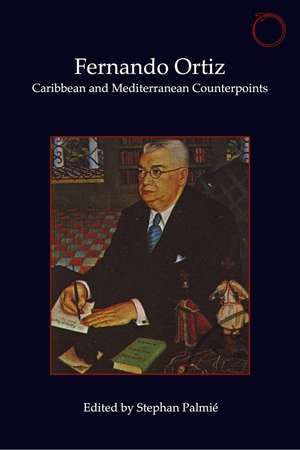Fernando Ortiz: Caribbean and Mediterranean Counterpoints: Special Issues in Ethnographic Theory
Editat de Stephan Palmiéen Limba Engleză Paperback – 15 sep 2023
Fernando Ortiz (1881–1969) coined the term “transculturation” in 1940. This was an early case of theory from the South: concepts developed from an explicitly peripheral epistemological vantage point and launched as a corrective to European and North American theoretical formulations. What Ortiz proposed was a contrapuntal vision of complexly entangled processes that we, today, would conceptualize as cultural emergence.
Inspired by Ortiz, this volume engineers an unprecedented conversation between Mediterraneanists and Caribbeanists. It harnesses Ortiz’s mid-twentieth-century theoretical formulations to early twenty-first-century issues pertinent to both regions, including migration, territorial sovereignty, and cultural diversity. The contributors explore this perspective (arguably formed during Ortiz’s youth in late nineteenth-century Menorca) in a dialogue between scholars of the contemporary Caribbean and Mediterranean to enable novel analytics for both regions and to more broadly to probe the promises and limits of Ortiz’s contribution for contemporary anthropological research and theorizing.
Preț: 239.25 lei
Preț vechi: 257.80 lei
-7% Nou
45.78€ • 47.93$ • 37.88£
Carte indisponibilă temporar
Specificații
ISBN-10: 1912808927
Pagini: 550
Dimensiuni: 152 x 229 x 43 mm
Greutate: 1.08 kg
Editura: HAU
Colecția HAU
Seria Special Issues in Ethnographic Theory
Notă biografică
Stephan Palmié is the Norman and Edna Freehling Professor of Anthropology and of Social Sciences at the University of Chicago. He is the author of many books, most recently The Cooking of History: How Not to Study Afro-Cuban Religion, and the editor of several volumes on Caribbean and Afro-Atlantic anthropology and history.
Cuprins
Stephan Palmié
BALEARIC BEGINNINGS
Fernando Ortiz (and the spiritists?) in the Balearic Islands and Catalonia
Gerard Horta
A network of networks: Fernando Ortiz, crossroad between cultures
Consuelo Naranjo Orovio
BORDER WORLDS
Border dialectics and the border multiple: A view from the northern Caribbean
Jeffrey Kahn
Strategies of dealing with the other: Coexistence and exclusion
Glenn Bowman
AFRO-CUBAN FETISHIZATIONS
True brujos and imitators: A reading of Fernando Ortiz’s Los negros brujos (1906)
Ramon Sarró
The fetishes of Fernando Ortiz
Jorge Pavez Ojeda
LINGUISTIC AND CULINARY PERSPECTIVES
The lexicographic studies of Fernando Ortiz Fernández
Sergio O. Valdés Bernal
The legacy of Ortiz’s Yorubization of Lucumí: Translation as transculturation
Amanda Villepastour
Reheating the ajiaco: Fernando Ortiz’s theorization of sacred cuisine
Elizabeth Pérez
ETHNOGRAPHIES OF TRANSCULTURATION
Clay and earth: Excavating partialities and relations
Olivia Maria Gomes da Cunha
Minhoto counterpoints: On metaphysical pluralism and social emergence
João Pina-Cabral
The intensive image: Transculturation, creativity and presence in the cult of María Lionza
Roger Canals
“I certainly didn’t expect the Spanish Inquisition!” Politics of transculturation in a Spanish enclave in North Africa
Brian Campbell
REPRINT
Talking culture thirty years on—Revisited
Verena Stolcke
Talking culture: New boundaries, new rhetorics of exclusion in Europe
Verena Stolcke
AFTERWORD
Caribbean–Mediterranean counterpoint
Charles Stewart
Index
Recenzii
Descriere
Cross-regional scholarly dialogue inspired by the work of the pioneering Cuban scholar.
Fernando Ortiz (1881–1969) coined the term “transculturation” in 1940. This was an early case of theory from the South: concepts developed from an explicitly peripheral epistemological vantage point and launched as a corrective to European and North American theoretical formulations. What Ortiz proposed was a contrapuntal vision of complexly entangled processes that we, today, would conceptualize as cultural emergence.
Inspired by Ortiz, this volume engineers an unprecedented conversation between Mediterraneanists and Caribbeanists. It harnesses Ortiz’s mid-twentieth-century theoretical formulations to early twenty-first-century issues pertinent to both regions, including migration, territorial sovereignty, and cultural diversity. The contributors explore this perspective (arguably formed during Ortiz’s youth in late nineteenth-century Menorca) in a dialogue between scholars of the contemporary Caribbean and Mediterranean to enable novel analytics for both regions and to more broadly to probe the promises and limits of Ortiz’s contribution for contemporary anthropological research and theorizing.


